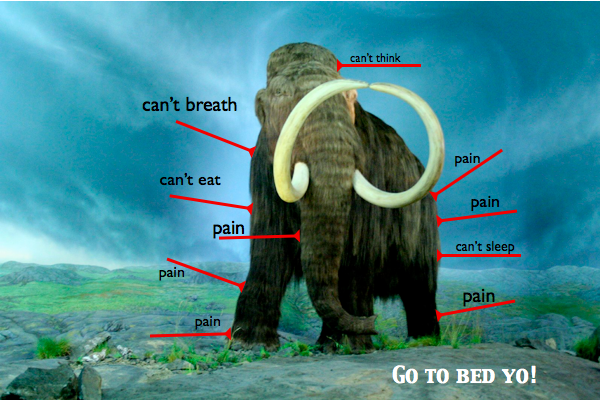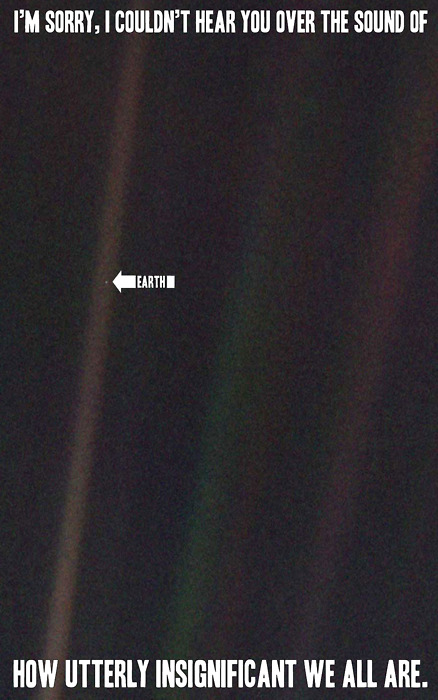Hey you.
So, I hear you have your motorcycle test booked for tomorrow. I also hear that while you thought you had your head sorted out about it, I have it on good authority that your belly was still churning like a cement mixer. Which means you were probably not actually sorted out about it (how’re those pangs down your arm treating you?).
Future Me, here are some notes from the eye of the belly storm. Three things that actually made a difference in calming our ass down.
1. Treats!
You are very good at giving yourself a little reward after success. But you never give yourself a consolation prize. (No, berating yourself is not a “prize”. Moron.)
What that means is you head into things with a prize in mind, just hoping that it will work out. But you let the sentence trail. You say “Okay, here goes, and if this doesn’t go well then…”
That ellipsis there? That gets us into trouble. Because when things don’t go well, through our own result, or just some random circumstance, we are left as a pile of goo. Because all we had “planned” for if it didn’t turn out was how incredibly sad we were going to be.
FAIL.
Think of something you really, genuinely, want. What would be amazing. What would you like so much, that if you can only have it if you “fail”, you might find yourself kinda hoping that you do fail, so much do you want this treat (*cough*facial!*cough*). Make it better than your “everything went great!” reward. Got it? Good. That is the thing you get if it doesn’t work out. WIN!
2. Do something else.
Have you lost perspective? Have you built this thing up into The Thing of All Importance. No? … Are you lying?
Yes you are. You are so worried and so nervous. Because you have to get 100%. If you don’t get 100%, we have it on pretty good authority that the world will end and you will be useless.
Oh. No. Wait.
Actually, we had that on bad authority. For a very long time. We have since replaced that with good authority that the world will, in fact, go on. You will live to try another day. Having to do something more than once is not failure. Failure actually does lead to learning. You do many things, you have accomplished much, and you are not, by any stretch of any imagination, useless.
Trying to do something hard or new or unusual that you aren’t perfect at right away is much more valuable than the thing you never have to work for but are “naturally” good at.
Got it? Good.
Now. Go do something that has nothing to do with what you’re stressed about. If it’s work, go for a run. If it’s exercise, bake. If it’s mountain biking, read a book. Go to opposite land! Your life is bigger than any one thing. No one thing is that important. They’re all moving forward. Some faster, some slower. You’re working out your skills in lots of areas. There is balance. It is all good. Try, learn, fail, fight, win.
3. This too shall pass.
Being predisposed against religion means that sometimes good idea babies are lost to retrograde authoritarian bathwater. Like the phrase: “This too shall pass”. Perhaps the only sentiment that means something to me/Me, even after detentacling Catholicism from my brain. (Yeah yeah, don’t steal, be nice to people, etc. I still hold to those, they got a free pass under “duh”.)
“This too shall pass” is a good and useful truth. It’s about change. All change. A person doesn’t look at an adorable kitten and say “this too shall pass” (unless they’re a person who wears a lot of black eyeliner). Though it’s equally applicable. Everything changes and everything ends. Good and bad. Stressful, frivolous, flippant or significant.
That includes motorcycle tests. One way or the other, it will be over. You will go on. More decisions will be made. Tests can be retaken (for free even). You will still be you. You will figure it out. This too shall pass.
I know sometimes we can be a bit balls at managing our stress. We’re getting better though, teamie. Give yourself credit for that. While you’re at it, give yourself credit for everything. You are so quick to focus on what you haven’t done yet, or the “lost” 5%. Stop that. Enjoy your accomplishments. Enjoy where you’ve got to. It’s a good damn place.
Oh, and also? At 30, you took one of your dreams and made it happen. Studied, tested, passed, registered, studied, tested, passed, purchased, practiced, improved. Were told you’re doing great and at exactly the right spot to pass this next test. New skills, the very best kind. Still alive? Then there is still time.
And if you don’t pass tomorrow, on your very first try, that facial is still going to feel so damn good.




